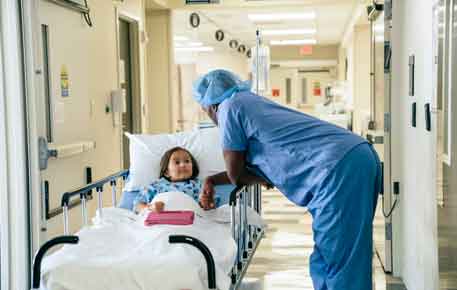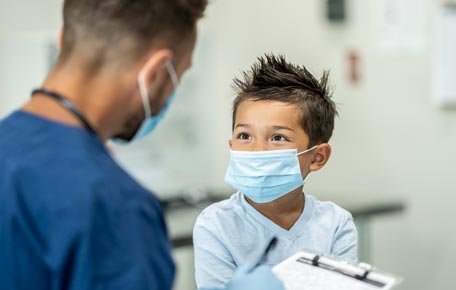Finding out your child has a craniofacial condition can be overwhelming. These conditions can change your child’s facial features or impact their development in multiple ways. With craniofacial conditions may change how your child experiences and communicates with the world. Any treatment that affects this area is critically important. You want to make sure the team that helps your child is the best available.
At UVA Health Children’s, our craniofacial team includes specialists from around the hospital. Every child, every family, and every craniofacial condition is unique. And so is the treatment plan we’ll develop for your child. We’ll address your concerns, and make sure you have the information you need every step of the way.
Diagnosing & Treating Complex Craniofacial Conditions at UVA Health Children’s
While some craniofacial conditions can be seen at birth, others develop over time. During the first year of life, your baby’s head grows rapidly. As it grows, it may start to look flat, peaked, or otherwise oddly shaped. If it does and seems to be getting worse, it's best to see a doctor soon. Many craniofacial conditions are easiest to treat early.
Many pediatricians refer their patients to UVA Health Children's complex craniofacial team for evaluation and treatment.
Craniofacial Treatments
Not all craniofacial conditions require surgery. If your child’s condition is mild and isn’t likely to cause a problem, we can use other treatments.
These include:
- Cranial helmeting
- Physical therapy
- Speech and language therapy
Minimally Invasive Procedures
Because a newborn’s head isn’t fully formed, we can sometimes offer a minimally invasive treatment. These have a shorter recovery time and require less time in surgery.
Surgery
UVA Health Children’s pioneered many of the first surgeries for craniofacial conditions. Since then, we’ve continually worked to improve these procedures.
We perform more craniofacial surgeries than any other center in Virginia and have received rewards for our outcomes.
Conditions We Treat
- Apert syndrome
- Brachycephaly
- Cavernous malformations
- Cleft lip and palate
- Chiari malformation
- Crouzon syndrome
- Encephalocele
- Hemifacial microsomia
- Hydrocephalus
- Kleeblattschadel syndrome
- Non-syndromic & syndromic craniosynostosis
- Oxycephaly
- Pfeiffer syndrome
- Pierre Robin syndrome
- Plagiocephaly
- Saethre Chotzen syndrome
- Scaphocephaly
- Trigonocephaly

Getting Your Child's Surgery at UVA Health Children's
Sending your child into surgery can be scary, for them and for you. Our surgical teams are experienced at working with children. Compassionate care makes surgery feel less intimidating.
Imaging for Craniofacial Conditions
Even though a condition may look obvious, imaging is a crucial part of diagnosis. This helps us see any unique changes. We’ll use MRI or a CT scanner to look at your child’s:
- Skull
- Brain
- Eye structure
- Jaw structure
- Teeth
Some (but not all) conditions that cause craniofacial abnormalities are genetic. We may also recommend genetic testing for your child. If they have a genetic condition, we can also test the rest of your family.

Imaging That's Kid-Safe
Our radiology department specializes in working with kids. We have equipment that’s the right size for them. And we’re experienced with helping them hold still for imaging.
Our pediatric radiologists' experience allows them to use the lowest amount of radiation possible and still get a clear image.
Follow-Up Care & Support
After we’ve treated your child’s condition, we’ll continue to provide follow-up care along with your local pediatrician.
Sometimes conditions require multiple operations. If that’s the case for your child, we’ll work with you on timing. It’s important to give your child time to heal.
Have to Travel?
We take some of the most complex cases from around the state. That means you may have a long way to travel. We can help coordinate care to reduce the number of trips you’ll make. We also:
- Offer telehealth visits
- Partner with therapeutic centers around the state
- Consult with your regular pediatrician
Your Care Team
Once we better understand your child’s condition, we can pair them with specialists to address their concerns.
Most of the time, your child's care team will include a neurosurgeon and a plastic surgeon. Your child may also need these specialists: